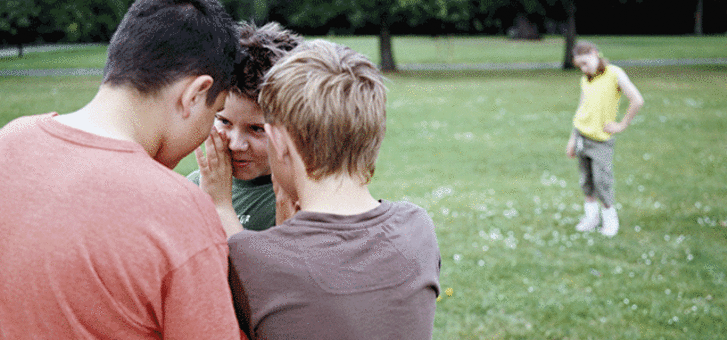We'd all like to think our children are leadership material. Yet just as there is a thin line of distinction between confidence and arrogance, humility and subservience, genius and madness, so there is a thin line separating leadership from bullying.
“Kids don’t suddenly become bullies,” says Dr Laura Markham, author of Peaceful Parent, Happy Kids: How to Stop Yelling and Start Connecting. “They begin by treating others with disrespect in small ways. If no-one challenges them, the behaviour becomes ingrained. So the signs for parents to watch for are any kind of disrespectful comments to and about others.”
At what point does your child depart from the straight and narrow and start veering toward more dangerous territory? Following are five warning signs parents should learn to recognise.
1. Bullies crave power; leaders work collectively
Does your child often undermine someone else’s work to make himself look good in front of you or their teacher? Leaders want to take the whole team forward. While they’re interested in the collective outcome of an activity, they also observe and coach individual performances within the team to lift the bar for the entire team.
Bullies, on the other hand, are interested only in ensuring that their own achievements alone are in the limelight. They feel like they should be the centre of everyone’s world and that everyone will jump to do their bidding. They’re selfish. They constantly seek attention.
2. Bullies abuse authority; leaders use authority with discretion
Does your child often interrupt classmates before they’ve finished speaking? Does he tend to keep the best for himself? Is she hesitant to allow anyone to do something she thinks might put her in a bad light?
Leaders use their authority for the right reasons. They will also gladly withhold their authority for the best result if they’re convinced it’s the right thing to do.
Bullies misuse their authority. They’ll play favourites, allowing themselves special privileges while taking pleasure in denying privileges to others. They have no regard for authority and neither care nor understand that hand-in-hand with authority goes responsibility. They’re often insolent and care too much about their standing in everyone’s eyes.
Markham says, “When children are four or five years old, they experiment with using power, which includes how to get what they want from others. So they engage in a mild form of bullying, along the lines of, ‘If you don’t do what I want, you can’t come to my birthday party!’
“When parents notice this in their children, they can intervene to set limits about what’s appropriate in relating to others and to help the child find win-win solutions."
“When kids are older, parents are often not present when bullying occurs, so parents need to be sensitive to any comments from other parents about how their child acts. Even a mild use of force with peers is inappropriate.”
3. Bullies lack empathy; leaders see others’ points of view
Do other children complain that your child is unapproachable, intimidating or not open?
One of the most valuable qualities of a good leader is empathy. Leaders will be well versed with the problems and issues others are faced with. They give freely and care about the team.
Bullies find it difficult to see things from another person’s point of view. They love playing the blame game and nothing is ever their fault. When confronted with a problem, they will look out for themselves first and care about the team later.
Bullies think nothing of taking the credit for someone else’s work or making it appear as if they are the reason for others’ success. They don’t understand teamwork and team spirit.
4. Bullies use sticks instead of carrots; leaders inspire and encourage
Does your child find it difficult to genuinely enjoy someone else’s success or to honestly commend someone for their good work? Does he often resort to veiled warnings of unpleasant consequences to get his way?
When goals are clear and everyone on the team wants to be moving in the same direction, it’s easier to sustain the momentum by rewards and appreciations than by punishments and threats. Leaders invest time and energy in building trust. They earn the respect of their team members.
Bullies, on the other hand, use the sticks-and-stones approach to drive the team. They thrive in an environment of fear, uncertainty and doubt. They play on people’s emotions to extract allegiance. They use shortcuts, often unethical and immoral, as a way to get a job done.
5. Bullies are unperceptive; leaders understand their teammates
Can your child list three strengths and three weaknesses of each of their friends?
Leaders are highly discerning people. They have trained themselves to find out what works best with teams, what makes certain individuals tick, whose strengths will aid a project, and whose weaknesses need to be worked on for the team to achieve the desired outcome. They can anticipate their friends’ needs, fears, anxieties, issues and expectations. Leaders know what motivates their team members and they make these things a part of their team’s culture.
Bullies take no interest in what others think, say or do. They’re dictators and they’ll unflinchingly steamroll over others’ feelings and opinions. Because they don’t bother “reading” others, they’re ill-prepared to make appropriate responses or strategies well in advance. They rarely bring out the best in their team.
What You Can Do
If you recognise any of the signs in your child, they may well be on the path to becoming a bully. You need to coach them to objectively assess their behaviour. Unless they accept the idea that they have room for improvement, they won’t be open to any guidance from you.
- Remind your child to put the team first and share the credit. They don’t need to underplay their own contributions, but they should avoid making it sound like they’re the saviour of mankind. Ask them to give their teammates some freedom to do things their way. Their teammates may fall down a couple of times, but they’ll learn from their mistakes and be the better for it.
- Remind your child to use their authority wisely and responsibly. No-one can avoid making a wrong decision now and then, but it’s better if they have valid justifications for it rather than having to rely on vague impressions and assumptions.
- Remind your child to listen with their mind and not just with their ears. Those who disagree with them aren’t complete imbeciles—they need to be given the benefit of the doubt.
- Teach your child never to show their displeasure with a team member in public. They should learn to be frank and straightforward but not rude or aggressive.
- At the same time, teach your child to always be vocal in giving praise, to give frequent expressions of appreciation. This will greatly help to boost team productivity!
- Encourage your child to understand the people they associate with. Suggest that they take time to find out about their teammates’ preferences, their likes and dislikes, their attitudes and opinions. They should then use this knowledge to pull the team from the front instead of pushing them from behind.
“Bullying is in the eye of the beholder,” says Markham. “Kids won’t see themselves as bullies."
“The most important thing parents can do to avoid raising a child who bullies is to [themselves] treat their child and others with empathy and respect. If parents relate to others, including their children, by looking for win-win solutions instead of resorting to power to solve problems, their kids will follow their lead. If parents resort to threats, punishment and yelling or make mean comments to or about others, they’re role-modelling bullying attitudes and behaviour.”
She continues, “When parents hear their child make mean comments about others, even when the other person is not present, they need to engage in a discussion—not a lecture—about why the child is feeling upset at the other person and how they can appropriately address the situation."
“As they get older and are relating to peers on social media, even kids who will usually be kind to others in person will sometimes engage in bullying. Parents need to regularly supervise their children’s use of texting and Facebook in the beginning, and to discuss inappropriate interactions with them.”
A bully is a person in need of help. A leader is a person who can provide such help. Take the bull(y) by its horns and show your child how to be a leader, not a bully.






